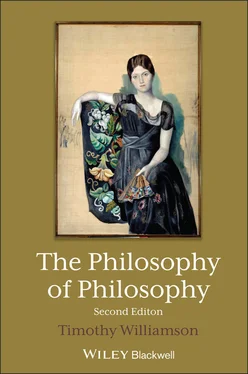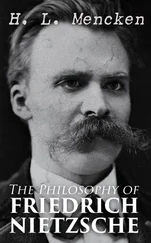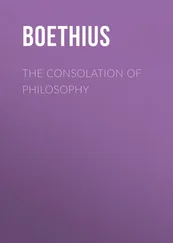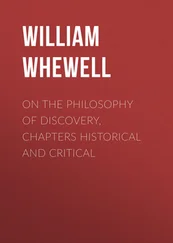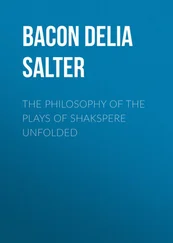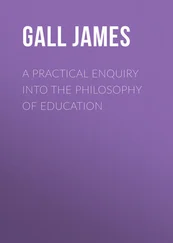The best we can do is to put the disjunction of T analyticand T syntheticin the third column. But then in order to apply the truth-table iteratively, when one occurrence of → is embedded inside another, we shall need further lines in which such disjunctions appear in the first two columns as well as the third. In effect, we have merely recovered a single sense of “true,” applicable to both analytic truths and synthetic truths, albeit awkwardly defined by a disjunction. The same conclusion can be reached by looking at combinations of other logical constants, such as conjunction and negation. What does the central work in the compositional semantics is that indiscriminate notion of truth, not the more specific notions of analytic truth and synthetic truth.
A corresponding result holds for the theory of logical consequence. Valid arguments preserve truth from premises to conclusion. What can we say if “truth” must be disambiguated between analytic truth and synthetic truth? A valid argument whose premise is a synthetic truth may have either a synthetic truth or an analytic truth as its conclusion. For example, the conjunction of a synthetic truth with an analytic truth is itself a synthetic truth, and has each conjunct as a logical consequence. For logic, the significant generalizations concern the indiscriminate disjunction of analytic truth with synthetic truth, not either disjunct separately. 8
Analytic truths and synthetic truths are true in exactly the same central sense of “true.” That is compatible with their being true in very different ways, just as being a mother and being a father are two very different ways of being a parent; “parent” is not ambiguous between mothers and fathers. But truth-conditional semantics undermines even that idea. For how are (3) and (4) true in very different ways? Each is a material conditional; the antecedent and consequent of each are true in relevantly the same way as the antecedent and consequent of the other respectively. Their compositional semantic evaluation proceeds in parallel. Yet (3) is analytic, (4) synthetic. From the perspective of compositional semantics, the analytic-synthetic distinction is no distinction between different ways of being true; it is just a distinction between some truths and others.
On the metaphysical conception, analytic truths differ from synthetic ones by being true “in virtue of meaning.” The intended contrast seems to be this. A synthetic truth is true because it means what it does and things are as that meaning requires. For example, “Barbara is a barrister” is true because it means that Barbara is a barrister, and Barbara is a barrister. For an analytic truth, the second conjunct drops out. “Barristers are lawyers” is true simply because it means that barristers are lawyers. Nothing else is needed. But the contrast is unconvincing. For that explanation of the truth of “Barristers are lawyers” works only when we take for granted that barristers are lawyers. It is no good to say “Never mind whether barristers are lawyers; ‘Barristers are lawyers’ is true simply because it means that barristers are lawyers.” For any true sentence s whatsoever, a canonical explanation of the truth of s takes the overall form “ s means that P, and P.” 9To use the obscure locution “in virtue of,” every true sentence is true in virtue of both its meaning and how things are. This is another way of making the point that analytic truths and synthetic truths are not true in radically different ways. 10
We can ask “in virtue of” questions about non-metalinguistic matters too. In virtue of what are vixens female foxes? To use another obscure locution, what makes it the case that vixens are female foxes? An appeal to semantic or other facts about the words “vixen,” “female” and “fox” in answer to those questions would confuse use and mention. Vixens would have been female foxes no matter how we had used words. Presumably, vixens are female foxes in virtue of whatever female foxes are female foxes in virtue of; what makes it the case that vixens are female foxes is whatever makes it the case that female foxes are female foxes. Some may argue that female foxes are not female foxes in virtue of anything; nothing makes it the case that female foxes are female foxes. The suggestion may be that analytic truths require no truthmaker, unlike synthetic truths. An alternative suggestion is that analytic truths require truthmakers of a different kind from those of synthetic truths. Such suggestions are too unconstrained to be tractable for assessment. Still, two points stand out. First, they seem to conflict with general principles of truthmaker theory (in the unlikely event that such a theory is needed). For instance, what makes a disjunction true is what makes one of its disjuncts true. Thus whatever makes (2) (“Barbara is a lawyer”) true also makes both (5) and (6) true:
(5) Barbara is a lawyer or Barbara is not a lawyer.
(6) Barbara is a lawyer or Barbara is a doctor.
But (5) is a simple logical truth, while (6) is a straightforward synthetic truth. Second, no connection has been provided between truth-maker theory and epistemology. Knowing a truth need not involve knowing its truthmaker; one can know (6) without knowing which disjunct is true (Barbara works in a building where only lawyers and doctors work). No account has been given as to why it should be easy from an armchair to know a truth with no truthmaker, or a truthmaker only of the special sort supposedly appropriate to analytic truths.
Nevertheless, at least one clear difference between paradigms of “analytic” and paradigms of “synthetic” is in the vicinity. For meaning that barristers are lawyers is sufficient for being true, whereas meaning that Barbara is a barrister is not. More generally, call a meaning sufficient for truth just in case necessarily, in any context any sentence with that meaning is true. 11Thus the meaning of “Barristers are lawyers” is sufficient for truth; the meaning of “Barbara is a barrister” is not. One proposal is to explicate “analytic truth” as “truth whose meaning is sufficient for truth.” Call this “modalanalyticity.” 12For non-skeptics about meaning and necessity, the notion of modal-analyticity is quite intelligible. But what are its consequences?
Consider any non-indexical sentence s that expresses a necessarily true proposition. Necessarily, in any context, any sentence with the actual meaning of s expresses that necessary truth and is therefore true. Thus s is a modal-analytic truth, because its meaning is sufficient for truth. In that sense, it is true in virtue of meaning. But how little has been achieved in so classifying it! Nothing has been done to rule out the hypothesis that it expresses a profound metaphysical necessity about the nature of the world, knowable if at all only through arduous a posteriori investigation, for instance. No reason has been provided to regard s as “merely verbal” or “insubstantial” in a pretheoretic sense, unless one already had independent reason to regard all necessities as merely verbal or insubstantial. Similarly, mathematical truths count as modal-analytic; their so counting is by itself no reason to regard them as merely verbal or insubstantial. Indeed, for all that has been said, even “Water contains H2O” is modal-analytic, given that “water” has a different meaning as used on Twin Earth to refer to XYZ, a different substance with the same superficial appearance.
To make the point vivid, call a meaning temporally sufficient for truth just in case at all times, in any context any sentence with that meaning is true. Read the quantifiers “at all times” and “in any context” non-modally, so they do not range outside the actual world. Thus any sentence which expresses, in a time-independent way, an eternally true proposition, however contingent, has a meaning temporally sufficient for truth. For example, the meaning of “No hotel ever has a billion rooms” is presumably temporally sufficient for truth. We can call the sentence “temporal-analytic” if we like, but that in no way implies that it is somehow insubstantial, because there is no background connection between eternity and some sort of insubstantiality. Similarly, calling a sentence “analytic” in the sense of modal-analyticity does not imply that it is somehow insubstantial, in the absence of a background connection between necessity and some sort of insubstantiality. Yet the account of analyticity was what was supposed to substantiate the claim of insubstantiality. If we already had a background connection between necessity and insubstantiality, there would be little to gain from invoking modal-analyticity in order to argue that core philosophical truths are insubstantial, since we could do it more simply just by arguing that true philosophical sentences in the core express necessarily true propositions.
Читать дальше
